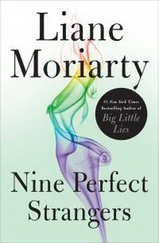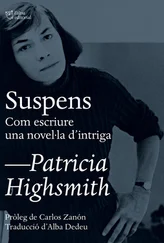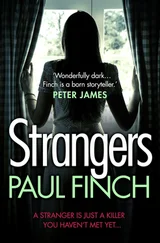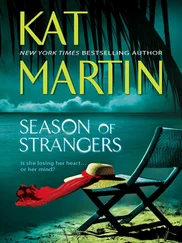“You know,” Bruno said quietly. “What we talked about on the train. The exchange of victims. You’re going to kill my father.”
Guy made a sound of contempt. He had known it before Bruno said it, had suspected it since Miriam’s death. He stared into Bruno’s fixed, still wistful eyes, fascinated by their cool insanity. Once as a child he had stared at a mongoloid idiot on a streetcar, he remembered, like this, with a shameless curiosity that nothing could shake. Curiosity and fear.
“I told you I could arrange every detail.” Bruno smiled at the corner of his mouth, amusedly, apolegetically.“It’d be very simple.”
He hates me, Guy thought suddenly. He’d love to kill me, too.
“You know what I’ll do if you don’t.” Bruno made a gesture of snapping his fingers, but his hand on the table was carelessly limp. “I’ll just put the police onto you.”
Ignore him, Guy thought, ignore him! “You don’t frighten me in the least. It’d be the easiest thing in the world to prove you insane.”
“I’m no more insane than you are!”
It was Bruno who ended the interview a moment later. He had a 7 o’clock appointment with his mother, he said.
The next encounter, so much shorter, Guy felt he lost, too, though at the time he thought he had won. Bruno tried to intercept him one Friday afternoon as he was leaving his office on the way to Long Island to see Anne. Guy simply brushed past him and climbed into a taxi. Yet a feeling of having physically run away shamed him, began to undermine a certain dignity that had up to them been intact. He wished he had said something to Bruno. He wished he had faced him for an instant.
Twenty-One
In the next days, there was hardly an evening when Bruno was not standing on the sidewalk across the street from his office building. Or if not there, standing across the street from where he lived, as if Bruno knew the evenings he would come straight home. There was never a word now, never a sign, only the tall figure with the hands in the pockets of the long, rather military overcoat that fit him closely, like a stovepipe. There was only the eyes following him, Guy knew, though he did not look back until he was out of sight. For two weeks. Then the first letter came.
It was two sheets of paper: the first a map of Bruno’s house and the grounds and roads around it and the course Guy would take, neatly drawn with dotted and ruled ink lines, and the second a typed, closely written letter lucidly setting forth the plan for the murder of Bruno’s father. Guy tore it up, then immediately regretted it. He should have kept it as evidence against Bruno. He kept the pieces.
But there was no need to have kept them. He received such a letter every two or three days. They were all mailed from Great Neck, as if Bruno stayed out there now—he had not seen Bruno since the letters began—writing perhaps on his father’s typewriter the letters that must have taken him two or three hours to prepare. The letters were sometimes drunken. It showed in the typing mistakes and in the emotional bursts of the last paragraphs. If he were sober, the last paragraph was affectionate and reassuring as to the ease of the murder. If he were drunk, the paragraph was either a gush of brotherly love or a threat to haunt Guy all his life, ruin his career and his “love affair,” and a reminder that Bruno had the upper hand. All the necessary information might have been gotten from any one of the letters, as if Bruno anticipated he might tear most of them up unopened. But despite his determination to tear up the next, Guy would open it when it came, curious as to the variations in the last paragraph. Of Bruno’s three plans, the one with a gun, using the back entrance of the house, came most often, though each letter invited him to take his choice.
The letters affected him in a perverse way. After the shock of the first, the next few bothered him hardly at all. Then as the tenth, twelfth, fifteenth appeared in his mailbox, he felt they hammered at his consciousness on his nerves in a manner that he could not analyze. Alone in his room he would spend quarter hours trying to isolate his injury and repair it. His anxiety was unreasonable, he told himself, unless he thought Bruno would turn on him and try to murder him. And he didn’t really. Bruno had never threatened that. But reasoning could not alleviate the anxiety, or make it less exhausting.
The twenty-first letter mentioned Anne. “You wouldn’t like Anne to know your part in Miriam’s murder, would you? What girl would marry a murderer? Certainly not Anne. The time is getting short. The first two weeks in March is my deadline. Until then it would be easy.”
Then the gun came. It was handed him by his landlady, a big package in brown paper. Guy gave a short laugh when the black gun toppled out. It was a big Luger, shiny and new-looking except for a chip off the crosshatched handle.
Some impulse made Guy take his own little revolver from the back of his top drawer, made him heft his own beautiful pearlhandled gun over his bed where the Luger lay. He smiled at his action, then brought the Texas gun up closer to his eyes and studied it. He had seen it in a glutted pawnshop window on lower Main Street in Metcalf when he was about fifteen, and had bought it with money from his paper route, not because it was a gun but because it was beautiful. Its compactness, the economy of its short barrel had delighted him. The more he had learned of mechanical design, the more pleased he had been with his gun. He had kept it in various top drawers for fifteen years. He opened the chamber and removed the bullets, three of them, and turned the cylinder around with six pulls of the trigger, admiring the deep pitched clicks of its perfect machinery. Then he slipped the bullets back, put the gun into its lavender-colored flannel bag, and replaced it in his drawer.
How should he get rid of the Luger? Drop it over an embankment into the river? Into some ashcan? Throw it out with his trash? Everything he though of seemed either suspect or melodramatic. He decided to slip it under his socks and underwear in a bottom drawer until something better occurred to him. He thought suddenly of Samuel Bruno, for the first time as a person. The presence of the Luger brought the man and his potential death into juxtaposition in his mind. Here in his room was the complete picture of the man and his life, according to Bruno, the plan for his murder—a letter had been waiting in his box that morning, too, and lay on his bed now unopened—and the gun with which he was supposed to kill him. Guy got one of Bruno’s recent letters from among a few in the bottom drawer.
Samuel Bruno (Bruno seldom referred to him as “my father”) is the finest example of the worst that America produces. He comes of low-class peasants in Hungary, little better than animals. He picked a wife of good family, with his usual greed, once he could afford her. All this time my mother quietly bore his unfaithfulness, having some concept of the sacredness of marriage contract. Now in his old age he tries to act pius before it is too late, but it is too late. I wish I could kill him myself but I have explained to you due to Gerard, his private detective, it is impossible. If you ever had anything to do with him, he would be your personal enemy, too. He is the kind of man who thinks all your ideas about architecture as beauty and about adiquate houses for everyone are idiotic & doesn’t care what kind of factory he has as long as the roof doesn’t leak and ruin his machinery. It may interest you to know his employees are on strike now. See N. Y. Times last Thurs. p .31 bottom left. They are striking for a living wage. Samuel bruno does not hesitate to rob his own son…
Who would believe such a story if he told it? Who would accept such fantasy? The letter, the map, the gun—They seemed like props of a play, objects arranged to give a verisimilitude to a story that wasn’t real and never could be real. Guy burnt the letter. He burnt all the letters he had, then hurried to get ready for Long Island.
Читать дальше












